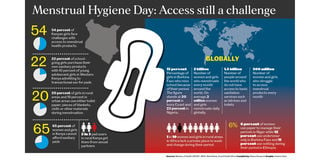‘I call it a basic need’, a decade of period poverty

What you need to know:
- Many girls and women lack access to affordable sanitary pads due to poverty, resulting in missed school days and increased risks like early pregnancies.
- Initiatives by individuals and organisations to donate pads have helped, but high costs, corruption, and stigma around menstruation perpetuate the menstrual hygiene crisis affecting millions of girls.
Josephine Lukote, a high school teacher in Western Kenya, has actively engaged in at least two sanitary pad donation programs. Her motivation stems from witnessing the significant risks posed by the absence of proper sanitary hygiene products for many young girls.
“I live in a neighbourhood where prostitution has become an economic activity. Young girls have been recruited to this menace because of the lack of this vital product. I call it a basic need. As a result, so many girls have become victims of early pregnancies, from as early as 12 years, or when they are in Form One,” she says.
Observing this troubling situation compelled Josephine and some friends to pool their resources, donate money, and purchase essential sanitary products and other small items for girls in need.
"This would allow them not to miss school and also keep them from sleeping around with truck drivers and boda boda men for money," she says, underscoring the profound impact that access to menstrual hygiene products can have on protecting young girls' well-being and futures.
Phoebe Micasso, a businessperson from Kitale, used to contribute to a non-governmental organisation that donated sanitary pads to girls across the country.
However, when the organisation stopped, she continued supporting the girls independently.
"They still require pads and would struggle without them," she explains. "I currently support girls at a primary school in Migori, Olympic Primary School in Kibera, and my local church in Kiminini."

A woman holds a piece of cloth she uses as a sanitary pad in Kangemi on October 18, 2022. For lack of money to buy the pads, some women opt to using such when they get their periods.
Menstrual hygiene for women and girls encompasses access to sanitary products, clean water, information about menstruation, and clean toilets. A joint report by Unicef and WHO, Progress on Household Drinking Water, Sanitation and Hygiene 2000-2022 (with a special focus on gender)," found that two billion people worldwide, menstruate every month. Unfortunately, data also shows that at least 500 million women and girls cannot afford sanitary products every month.
This year marks a decade since Menstrual Hygiene Day was first observed in 2014, highlighting menstrual hygiene issues.
Primary causes of unmet menstrual hygiene needs include the high cost of menstrual products, rendering them unaffordable for many living in poverty, period-related shame and stigma, and the unavailability of toilets and latrines.
Josephine believes the government should reduce taxes on menstrual hygiene products.
"Many (women and girls), despite being as cheap as Sh50, still can't afford them because they need like two of them every month. Apart from that, poverty makes them choose between food and buying a pack of pads. And definitely, they choose to buy food. I also think pads need to be available for free at the chief's camp," she says, echoing global data that identifies poverty as the primary driving factor for lack of access to menstrual products.
Unfortunately, initiatives like Josephine's and many others in the country are not always sufficient to lift girls from the perpetual dearth of hygiene products.
Phoebe too, notes that corruption has also led to girls lacking access to much-needed sanitary products.
"While there are programs in schools to ensure girls get pads regularly, many still miss classes because some dishonest people misuse funds meant for purchasing sanitary pads," she explains.






